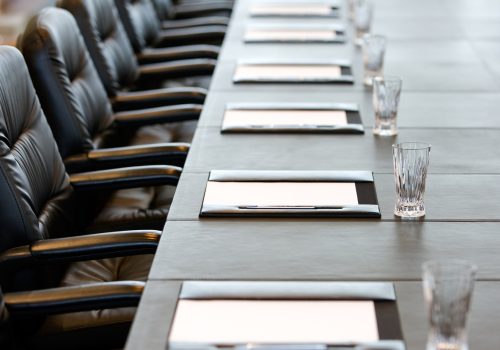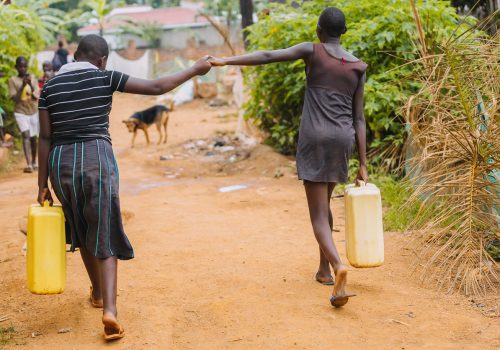Democratic challenges at Bretton Woods Institutions
In 1950, the Group of Seven (G-7), alongside Australia and eleven other major European economies United States, United Kingdom, Canada, France, Germany, Italy, Japan, Australia, Austria, Belgium, Denmark, Finland, Ireland, Netherlands, Norway, Portugal, Spain, Sweden, and Switzerland., accounted for around 80% of the global GDP and 60% of global trade. By 2019, their share of GDP was down to about 39%, and their share of trade declined to around 48% (Table 1). Similar trends were also visible for capital stock — declining from 87% to 39% — and population — declining from 47% to 12% — between 1950 and 2019. In other words, the share of emerging markets and developing economies (EMDEs) in global output, trade, capital stock, and population has risen over the past seven decades, especially so in the past three decades. China, Japan, India, Brazil, South Korea, and a few South-East Asian economies primarily drove these shifts in the global economy.
Despite such significant changes, the institutions governing the global economy have failed to adapt. Since their inception at the ending years of World War II, the decision-making and governance structure of the Bretton Woods Institutions (BWIs), the World Bank Group (WBG) and International Monetary Fund (IMF), have stagnated. Little has changed to reflect the shifts in the structure of the global economy and trade in the past seven decades. Specifically, the distribution of voting quotas and process of election of BWIs’ leadership have mainly remained the same, reflecting the realities of the world economy and power structure in 1944.
Decisions around the leadership of BWIs have been guided by the tradition that an American would lead the WBG, and the IMF Managing Director should be a European. This informal gentlemen’s agreement reflects the political and economic realities at the end of World War II — which, as highlighted above, have changed drastically. Many member countries, led by China, have loudly criticized the tradition and called for fair elections.
However, the influence of American and European leadership is ingrained in the election system. Based on the bylaws of these institutions, candidates for the leadership office must be from member countries and obtain more than 50% of the votes to be elected to the office. In 2012, two non-U.S. candidates were on the ballot for the first time in the World Bank’s presidential election’s history. While José Antonio Ocampo (from Colombia) eventually withdrew his candidacy, the Nigerian finance minister, and the current Director-General of WTO, Ngozi Okonjo-lweala, remained on the ballot. With the votes of the United States, European countries, Japan, Canada, South Korea, and others, Jim Young Kim, an American, became the 12th American president of the World Bank and led the institution from 2012 to 2019. Therefore, while symbolically important, even in the case of a fair election, the votes of the United States and major European economies can shape the outcomes in favor of an American and European retaining institutional leadership in BWIs.
The United States continues to have the largest voting power in the WBG and IMF, holding greater than 15% of the voting power. Keeping a minimum of 15.01% voting power is critical for U.S. influence in these institutions. The majority of the WBG and IMF decisions require a 50% majority vote, while some critical matters require a 70% or 85% rate of affirmative votes. Holding a larger than 15% voting power grants the United States veto power in most cases (Table 2). Hence, no funding and quota increase, amendments, or other major actions can go into effect without U.S. consent. Moreover, the United States, Japan, Germany, France, United Kingdom, as well as other European countries and U.S. allies in various constituencies, hold more than 70% of all voting power in both institutions. It is therefore possible for the United States to easily rally support behind decisions that require a 50% majority vote — namely, the election of the WBG’s President and IMF’s Managing Director, if they were to be decided based on elections.
Unequal distribution of voting shares in the WBG and IMF is even present among member countries that have their own seats at the boards of WBG and IMF. When compared to their share in the global economy and population, some countries are over-represented — such as Saudi Arabia —while others are significantly under-represented — such as China (Table 2).
In terms of population, the United States, the majority of the European countries, and other high-income economies are massively over-represented in BWIs. The undemocratic distribution of votes in BWIs is of particular concern for the continued legitimacy and effectiveness of these institutions in the twenty-first century. In the International Bank for Reconstruction and Development (IBRD), for example, a G-7 citizen has 6- and 23-times more votes than an average person in the rest of the world and in South Asia, respectively (Figure 1). Some cross-country comparisons — countries with larger than a 10 million person population — paint an even starker picture of absence of democratic decision-making in BWIs (Figure 2). For example, an average Saudi and Belgian citizen has about 100- and 180-times more voting power in IBRD, when compared to an average Ethiopian, respectively (Figure 2). The IMF and other WBG organizations such as International Finance Corporation (IFC), Multilateral Investment Guarantee Agency (MIGA), and International Development Association (IDA) (less so) suffer from similar stark inequalities which are considered outrageous and unacceptable in any other setting. However, they are accepted as normal at the BWIs and are at the core of their operation.
Reforms have been introduced, albeit very slowly. There have long been calls by civil society and world leaders for the WBG and IMF to democratize their decision-making process or, at least to elect their leaders in a more transparent and democratic fashion. However, at the current pace of reforms, it will be decades before EMDEs attain more equal representation in the decision-making structure of the BWIs. For example, the last round of major IBRD reforms aimed to increase the voice and representation of EMDEs, or Developing and Transition Countries (DTC), was implemented in 2010. These reforms were based on the agreements reached in the Pittsburgh G20 summit in September 2009 and the Istanbul Development Committee meeting in October 2009, where IBRD shareholders agreed to raise the voting rights of DTC to 47%.
As a result of these agreements, China saw the most notable increase, from 2.77% of votes to 4.42% —which has since then increased to 5.06% as of October 2021 (Table 2). IMF reforms have faced more obstacles. Approval of the last round of major reforms —14th General Review of Quota— which was conducted in 2010, was delayed until December 2015 because the United States vetoed changes. Under the Bretton Woods Agreements Act, the U.S. Congress must authorize any changes to the U.S. quota in the IMF. This, in combination with the U.S. veto power at the Fund with its more than 15% of the voting share, means that any changes to IMF’s quota and capital must be approved by the U.S. Congress, making the U.S. Congress the “de facto parliament of the Fund”.
In addition to quota changes driven by these agreements, the IMF Board of Governors conducts a quota review every five years to discuss the overall size of the quota and its distribution among member countries. An individual member’s quota broadly reflects its relative standing in the world economy, which is guided by the following formula, last revised in 2008:
[(0.50*GDP) + (0.30*Openness) + (0.15*Variability) + (0.05* Reserves)] compression factor
However, the formula simply “plays a role in guiding” the discussion around quota increases and its redistribution. The ultimate decisions around these issues are based on intense negotiations among member states. Again, the veto power of the United States means no changes to quota or its redistribution is possible without the U.S. vote, which in turn is dependent on Congressional approval.
For EMDEs, the last round of IMF’s General Review of Quota resulted only in a 6% increase in their quotas. The increasing dissatisfaction of some member states —namely China— with the slow pace of reform in BWIs and their outdated and undemocratic governance structure is the main impetus in the establishment of new economic governance institutions, including the Asian Infrastructure Investment Bank (AIIB) and the New Development Bank (NDB). This trend presents new challenges for and threats to global multilateralism.
At the same time, the pandemic highlighted the growing necessity for active multilateralism and a coordinated response to global crises —which are increasing in frequency and severity. BWIs play a major role in this respect. However, inadequate reforms have undermined these institutions’ legitimacy and effectiveness, and limited their capacity to serve the interests of the global community. For decades, the World Bank Group and International Monetary Fund have managed to ignore meaningful reforms. But in a “new normal” world of increasing volatility and uncertainty, such reforms are a necessity and not a luxury.
Amin Mohseni-Cheraghlou is a consultant with the GeoEconomics Center and an assistant professor of Economics at the American University in Washington, DC.

At the intersection of economics, finance, and foreign policy, the GeoEconomics Center is a translation hub with the goal of helping shape a better global economic future.
Related reading
Image: Global Community International Networking Concept

